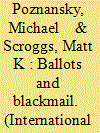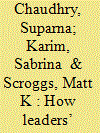| Srl | Item |
| 1 |
ID:
151281


|
|
|
|
|
| Summary/Abstract |
Does the restraint that prevents pairs of democracies from fighting large-scale wars also prevent them from coercing one another? While scholars have long drawn a bright line between using force and threatening it, the literature on democratic-peace theory overwhelmingly emphasizes the former. Using a dataset uniquely suited for the study of militarized compellent threats, we find that pairs of democracies are significantly less likely to engage in coercive diplomacy than are other types of regimes. We employ a variety of estimators to ensure the robustness of our results; the finding holds in all cases. We also elaborate on several alternative logics that might account for the hypotheses. This allows us to adjudicate between a variety of mechanisms. Our findings reveal that democratic-peace theory has broader applicability than even proponents give it credit for: not only are democracies less likely to fight wars with one another, but they also prove less likely to threaten each other with force.
|
|
|
|
|
|
|
|
|
|
|
|
|
|
|
|
| 2 |
ID:
182662


|
|
|
|
|
| Summary/Abstract |
The use of forced recruitment strategies during war can adversely affect military effectiveness and human rights. Given these costs, under what conditions do state leaders adopt coercive recruitment during civil wars? We find that between 1980 and 2009, states changed their recruitment practices 140 times during civil wars – half of which were towards coercive recruitment. Since structuralist explanations focus on factors that remain more or less constant over time, they cannot explain the frequency of these changes. Instead, we focus on individual-level factors and argue that leaders’ dispositions as risk-takers determine their beliefs about using force to solve collective action dilemmas during civil wars. Further, conflict context matters for leaders’ recruitment decisions – when rebel groups engage in coercive recruitment, leaders may also feel more justified in using such strategies. Using the LEAD Dataset and data on recruitment, we find that risk-tolerant leaders, including those who have had careers in the security sector, as well as those who have prior experience as a rebel or revolutionary leader, are more likely to use force to increase recruitment. While we theorize that this effect may be mitigated by combat experience, the evidence is mixed. Lastly, we find that rebels’ use of forced recruitment makes state leaders less likely to use voluntary recruitment.
|
|
|
|
|
|
|
|
|
|
|
|
|
|
|
|